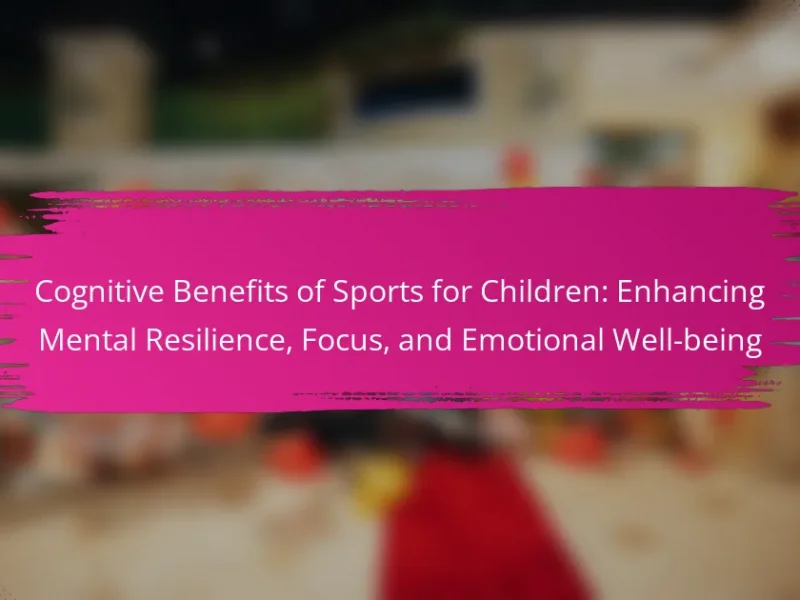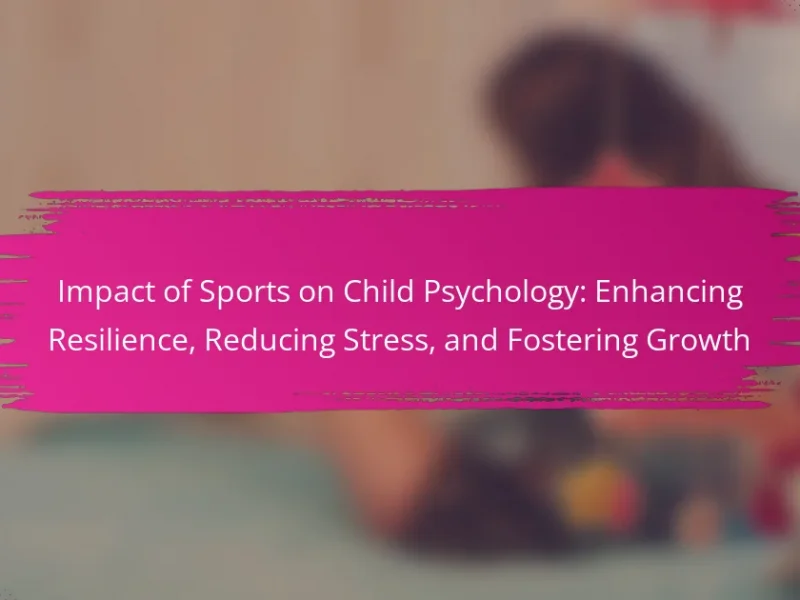Participating in sports significantly enhances children’s resilience, confidence, and stress management skills. Sports teach children to cope with challenges, build social skills, and improve mood through physical activity. Engagement in team sports fosters teamwork and communication, while also instilling discipline and goal-setting abilities. Understanding the psychological effects of sports can help parents and coaches support children’s mental well-being and development.

What are the psychological effects of sports on children?
Participating in sports significantly enhances children’s resilience, confidence, and stress management skills. Sports teach children to cope with challenges, fostering a growth mindset.
Engagement in team sports builds social skills, promoting teamwork and communication. This interaction boosts self-esteem as children learn to rely on peers and contribute to group success.
Physical activity releases endorphins, which help reduce stress and anxiety. Regular participation can improve mood and overall mental health, equipping children with tools to handle life’s pressures.
Additionally, sports instill discipline and goal-setting abilities. Children learn to set objectives, work towards them, and experience the satisfaction of achievement, reinforcing their confidence and resilience.
How does participation in sports enhance resilience in children?
Participation in sports significantly enhances resilience in children by teaching them to cope with challenges. Engaging in team sports fosters a sense of belonging, which boosts emotional support. Children learn to handle setbacks, such as losing a game, developing perseverance and problem-solving skills. Moreover, physical activity releases endorphins, reducing stress and improving mood, which is crucial for mental well-being. Studies indicate that children involved in sports exhibit higher self-esteem and confidence, contributing to their overall resilience.
What specific skills contribute to resilience through sports?
Engaging in sports cultivates specific skills that enhance resilience in children. Key skills include problem-solving, teamwork, and emotional regulation.
Problem-solving skills develop as children face challenges during games, teaching them to think critically and adapt strategies. Teamwork fosters social connections, helping children learn to rely on others and cope with setbacks collectively. Emotional regulation is vital, as sports teach children to manage stress and maintain focus under pressure.
These skills collectively contribute to a child’s ability to bounce back from adversity, making sports a powerful tool for building resilience.
How do team dynamics influence resilience building?
Team dynamics significantly enhance resilience building by fostering collaboration and support among children. Positive interactions among teammates lead to increased confidence and effective stress management. Research shows that children engaged in team sports develop coping strategies through shared experiences, which strengthens their emotional resilience. In addition, supportive team environments promote a sense of belonging, further contributing to psychological well-being.
In what ways does sports involvement boost children’s confidence?
Sports involvement significantly boosts children’s confidence through skill development, social interaction, and overcoming challenges. Engaging in sports helps children build a sense of achievement as they learn new skills, which enhances their self-esteem. Team participation fosters social bonds, providing support and encouragement from peers, further reinforcing confidence. Additionally, facing and overcoming obstacles in sports cultivates resilience, teaching children to handle setbacks positively. These experiences collectively empower children, equipping them with essential stress management skills and a stronger belief in their abilities.
What role do achievements play in developing self-esteem?
Achievements significantly enhance self-esteem by providing children with a sense of accomplishment. When children engage in sports, they experience success, which fosters confidence and resilience. This process reinforces their belief in their abilities, leading to improved self-worth. Studies indicate that children who achieve in sports often report higher self-esteem levels. As a result, these achievements contribute to better stress management skills and overall psychological well-being.
How can coaches foster confidence in young athletes?
Coaches can foster confidence in young athletes by providing consistent support and positive reinforcement. Building a trusting relationship encourages open communication, allowing athletes to express their feelings and concerns.
Setting achievable goals enhances self-efficacy, as athletes experience success through incremental progress. Incorporating team-building activities fosters a sense of belonging, which contributes to overall confidence.
Teaching coping strategies for managing stress equips athletes with tools to handle competitive pressures effectively. Regular feedback, focusing on effort rather than solely outcomes, reinforces a growth mindset.
Creating a safe environment where mistakes are viewed as learning opportunities encourages resilience and helps athletes develop a positive self-image.
What stress management skills can children learn through sports?
Children can learn vital stress management skills through sports, including teamwork, discipline, and emotional regulation. Engaging in sports teaches children how to cope with pressure and setbacks. For instance, they develop resilience by facing challenges during games and practices.
Sports also enhance confidence, as children experience achievement through skill improvement and teamwork. This boost in self-esteem contributes to better stress management in various life situations. Moreover, structured physical activity helps children learn how to express emotions constructively, leading to healthier coping mechanisms.
Overall, participation in sports equips children with essential psychological tools to manage stress effectively.
How do sports teach coping strategies for stress?
Sports teach coping strategies for stress by fostering resilience and confidence in children. Engaging in team activities helps young athletes learn to manage pressure, adapt to challenges, and develop problem-solving skills. For instance, studies show that children involved in sports exhibit lower levels of anxiety and improved emotional regulation. These experiences enhance their ability to cope with stress, making them more adaptable in various life situations. Additionally, the social support from teammates reinforces their coping mechanisms, providing a unique attribute of community that further aids in stress management.
What techniques are effective in managing competition-related stress?
Effective techniques for managing competition-related stress include mindfulness practices, positive self-talk, and structured preparation. Mindfulness helps children focus on the present, reducing anxiety. Positive self-talk fosters confidence, while thorough preparation enhances feelings of readiness. Each technique builds resilience, enabling children to cope better with competitive pressures.

What are the universal benefits of sports for children’s mental development?
Sports significantly enhance children’s mental development by fostering resilience, boosting confidence, and improving stress management skills. Participation in sports teaches children to navigate challenges, embrace failures, and develop a strong sense of self-worth.
Resilience is cultivated through overcoming obstacles in competitions, helping children learn persistence. Confidence grows as they achieve personal and team goals. Additionally, sports provide effective outlets for stress, allowing children to channel their emotions positively.
Research indicates that children involved in sports exhibit lower anxiety levels and improved mood regulation. The social interactions inherent in team sports also promote emotional intelligence, further benefiting mental health.
In summary, engaging in sports equips children with essential psychological tools that contribute to their overall mental well-being and development.
How does physical activity contribute to cognitive function?
Physical activity significantly enhances cognitive function by improving focus, memory, and problem-solving skills. Engaging in sports fosters resilience, boosts confidence, and aids in stress management for children. Studies show that regular exercise increases blood flow to the brain, promoting neurogenesis and cognitive flexibility. Additionally, physical activity can reduce anxiety and depression, contributing to better academic performance and social interactions.
What emotional benefits are commonly observed in young athletes?
Young athletes commonly experience enhanced resilience, increased confidence, and improved stress management skills. Engaging in sports fosters emotional growth by teaching them how to cope with challenges and setbacks.
Research shows that participation in sports can lead to higher self-esteem and a stronger sense of identity. Young athletes often develop a supportive network, which contributes to their emotional stability.
Additionally, sports provide a structured environment that helps children learn discipline and focus, further promoting their emotional well-being. As a result, these athletes tend to exhibit lower levels of anxiety and depression compared to their non-athletic peers.
In summary, the emotional benefits observed in young athletes include resilience, confidence, and effective stress management, all of which are essential for their overall development.

What unique psychological attributes can sports develop in children?
Sports can uniquely develop psychological attributes in children, such as resilience, confidence, and effective stress management. Engaging in sports fosters resilience by teaching children how to cope with failure and setbacks. Confidence is enhanced through skill development and achieving personal goals. Additionally, sports provide tools for stress management, allowing children to navigate challenges more effectively.
How does sports participation influence social skills?
Sports participation significantly enhances social skills in children by fostering teamwork, communication, and conflict resolution. Engaging in team sports encourages children to collaborate, share responsibilities, and develop empathy towards peers. As a result, they learn to navigate social interactions more effectively, which boosts their confidence and resilience. Moreover, studies indicate that children involved in sports are more likely to exhibit positive social behaviors and form lasting friendships. These benefits contribute to overall psychological well-being, demonstrating the profound impact of sports on social development.
What unique leadership qualities can emerge from youth sports?
Youth sports can cultivate unique leadership qualities such as teamwork, communication, and adaptability. These qualities emerge as children face challenges in competitive environments, fostering resilience. Participation in sports enhances confidence by encouraging children to set and achieve goals. As a result, they learn effective stress management skills through coping with wins and losses. These psychological effects contribute to their overall development, shaping them into capable leaders in various aspects of life.

What rare psychological challenges might children face in sports?
Children may face rare psychological challenges in sports, including performance anxiety, over-identification with athletic success, and social isolation from peers. Performance anxiety can hinder their ability to perform under pressure, while over-identification may lead to diminished self-worth outside of sports. Social isolation can occur when children feel different from their peers due to intense training or competition. Addressing these challenges is crucial for fostering resilience and emotional well-being in young athletes.
How can anxiety manifest in young athletes?
Anxiety in young athletes can manifest through physical symptoms, emotional distress, and performance issues. Common signs include increased heart rate, sweating, and difficulty concentrating. These manifestations can lead to decreased confidence and hinder stress management skills. Addressing anxiety early enhances resilience and overall psychological well-being in sports.
What are the less common mental health issues related to competitive sports?
Less common mental health issues related to competitive sports include performance anxiety, burnout, and overtraining syndrome. These conditions can hinder children’s resilience and confidence. Performance anxiety manifests as intense fear of failure, affecting focus and enjoyment. Burnout leads to emotional exhaustion and detachment from sports, while overtraining syndrome results in physical and mental fatigue, diminishing performance. Addressing these issues is essential for fostering healthy sports experiences and managing stress effectively.

What are best practices for supporting mental development in young athletes?
To support mental development in young athletes, focus on fostering resilience, confidence, and stress management skills. Encourage a growth mindset by emphasizing effort over results. Provide constructive feedback to build self-esteem and promote a positive self-image. Implement relaxation techniques, such as deep breathing or visualization, to help manage stress. Create a supportive team environment that values collaboration and emotional expression, which enhances social skills. Regularly assess mental well-being through open communication, ensuring athletes feel heard and valued.
How can parents effectively encourage a healthy sports experience?
Parents can encourage a healthy sports experience by fostering resilience, confidence, and stress management skills in their children. They should emphasize effort over outcome, promoting a growth mindset. Encouraging teamwork and setting realistic goals can enhance children’s enjoyment and participation in sports. Providing positive reinforcement helps build confidence, while open communication allows children to express their feelings about competition and challenges. Additionally, parents should model healthy coping strategies for stress, demonstrating how to handle setbacks constructively. Engaging in sports together can strengthen family bonds and reinforce positive attitudes toward physical activity.
What common mistakes should be avoided to ensure positive outcomes?
To ensure positive outcomes, avoid common mistakes such as neglecting individual differences, overemphasizing competition, and failing to communicate effectively. Recognizing that children have unique psychological needs is crucial. Overemphasis on winning can lead to anxiety, undermining resilience and confidence. Lastly, fostering open communication helps children express their feelings and manage stress effectively.
What expert insights can enhance children’s sports experiences?
Expert insights can significantly enhance children’s sports experiences by focusing on psychological development. Encouraging resilience helps children cope with challenges, fostering a growth mindset. Building confidence through skill mastery leads to improved self-esteem. Teaching stress management skills equips children to handle competition pressures effectively. These insights create a supportive environment, promoting overall well-being and enjoyment in sports activities.


